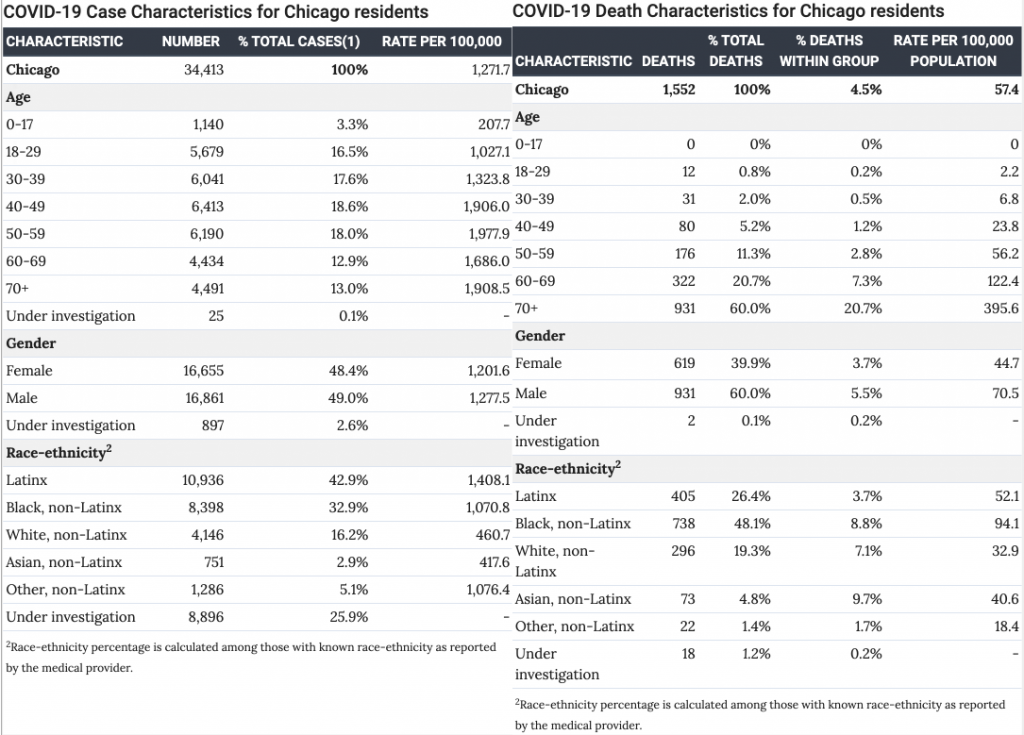Two Pandemics: Gun Violence, COVID-19 Hit African Americans, Latinos
ALSO’s mission is to work in partnership with people living in risk of violence to promote safer streets and homes. Now, it is strikingly clear that many of the same communities most likely to be in risk of gun violence are also disproportionately impacted by COVID-19. Data overwhelmingly show that many African Americans and Latinos in Chicago and around the country face two pandemics: One is a pandemic of gun violence, the other is COVID-19.
On May 6, Chicago Mayor Lori Lightfoot and public health Commissioner Dr. Allison Arwady pointed to the growing number of COVID-19 cases in the city’s Latino community. Meanwhile, May 14 data show the major impact of COVID-19 on African Americans and Latinos in Chicago. Data show that 42.9% of all people in the city who have COVID-19 are “Latinx.” Meanwhile, 32.9% of all people in the city who have COVID-19 are listed as “Black, non-Latinx.”
May 14 data also show that 48.1 of the people who have died from COVID-19 in Chicago are “Black, non-Latinx,” while 26.4% are “Latinx.”
The numbers fluctuate daily and weekly - but the trend of African American and Latino communities being hit the hardest persists. The city of Chicago updates the latest data on how COVID-19 is impacting city residents daily.
In Humboldt Park, where ALSO’s Safe Streets outreach team works to reduce gun violence, outreach staff, who are monitoring the community from their cars in response to COVID-19, wear protective masks and practice social distancing. They also share public information about COVID-19 with members of the community.

ALSO street outreach workers continue their work in Humboldt Park during COVID-19. Like many communities with predominately Latino and/or African American residents, Humboldt Park has been disproportionately affected by COVID-19.
While ALSO continues to provide outreach services in Humboldt Park, it is also a vital part of a growing citywide movement to reduce gun violence and advocate for safe responses to COVID-19 through Communities Partnering 4 Peace (CP4P), a partnership of leading outreach organizations working to impact Chicago communities most affected by gun violence. This partnership marks the first time that such efforts have been locally implemented on such a broad level. In April, Chicago Mayor Lori Lightfoot awarded $7.5 million in funding to Chicago community groups, including ALSO, as they fight COVID-19 and violence in city communities.
Jorge Matos, Director of ALSO’s Safe Streets program, whose outreach staff works in the Humboldt Park community every day, says that “When outreach workers clock in, they know they are possibly saving lives – whether they are is mediating a conflict or passing out information for community members to understand the pandemic.”
The impact of gun violence and COVID-19 in Humboldt Park, like many similarly affected communities, needs to play an integral role in how systems and policies respond to these crises.
The current situation, however, does not just reflect an immediate and deepening crisis. It reflects persisting inequities that have long resulted in inadequate health care and disinvestment in minority communities in Chicago and around the country.
Humboldt Park
In 2017, a survey conducted by the Sinai Community Health institute in Chicago documented major health-related challenges faced by many Chicago communities. (The survey is one of the largest community-driven, face-to-face health surveys ever conducted in the city). Results reveal a broad range of impacts in Humboldt Park related to health outcomes, clinical care, health behaviors, physical environment, and social and economic factors. For example, more than three-quarters of all community residents surveyed rely on either public health insurance (57%) or have no health insurance (19%). Today, these realities exist at a time when hospitals and health care providers are stretched as they try to meet a growing crisis. On Thursday, May 7, Jose Sanchez, CEO of Norwegian American Hospital in Humboldt Park, told WTTW TV that “there is a lot more COVID-19 in this community than we originally predicted. Many of our patients have pre-existing conditions, and we know they are much more at risk of dying than any other group.”
“What we are seeing now is that COVID-19 reinforces – and deepens – structural inequities and institutional barriers that prevent communities from thriving,” says Lori Crowder, Executive Director of ALSO. “Community-based organizations like ALSO are working with each other and the city, and partnering with communities to meet this challenge. We must continue and expand this work, and understand that many communities face two pandemics.”
Note: Almost since COVID-19 started, new data has confirmed the scope and depth of how African American and Latino communities have been impacted by the crisis. We will be updating this story periodically as new information is available. For daily updates from the city of Chicago, go here.


